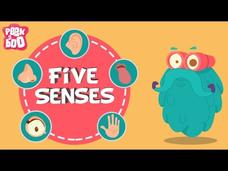Neuro Transmissions
How Do We See?
I can see clearly now the rain is gone...oh, and because I know all about the VISUAL SYSTEM! Going beyond the physics of the eye and how light works, how much do you know about how visual information gets sent to the brain? Alie...
Be Smart
Why Don't Other Animals Wear Glasses?
Viewers learn how eyes work to focus on objects. They see how a lens with a different shape changes the point of focus, requiring people to wear glasses or contacts. Viewers then learn how humans' eyes are different from other...
Scholastic
Study Jams! The Senses: Seeing
What will viewers see when they watch this video about vision? They will observe RJ and Sam hanging out during a power outage with Rookie, the dog. The boys discuss the structure of the eye (pupil, iris, cornea, lens, retina,...
National Academies of Sciences, Engineering, and Medicine
Supporting Emotional Wellbeing in Children: Calming Your Mind
Follow along with a quick video to learn the skill, Mindfulness 5-4-3-2-1. Young learners practice mindfulness to focus on themselves and their surroundings and calm their nerves. A narrator takes viewers through each step.
Be Smart
What If You Never Forgot Anything?
What would life be like if we never forgot anything? Challenge scholars to imagine the possibilities using a video from an extensive science playlist. Content includes how memories form, why forgetting is essential to learning, and what...
Bozeman Science
LS1D - Information Processing
Too much information? How does an organism process all of the sights, sounds, smells, and feelings it receives from its environment? Discover new ideas for presenting Next Generation Science Standard LS1D, Information Processing, in a...
Veritasium
Can You Perceive Acceleration?
Can our eyes detect changes in an object's motion? The video's narrator picks two unsuspecting volunteers to be at the center of an acceleration study. The resource compares the view of a distant landscape with an up-close observation of...
Be Smart
How To Hit A Major League Fastball (According to Science)
A baseball player with a vision of 20/7.5 can clearly see an object 20 feet away that normal folks could only see clearly at 7.5 feet away. This fact along with other interesting examples are explored in a video that explains how senses...
DoodleScience
Eye vs Camera
An informative video begins with explaining the parts and functions of each part of the eye. Then, it makes a comparison to the way a camera works.
Peekaboo Kidz
The Five Senses - The Dr. Binocs Show
Dr. Binocs shows viewers his bag of five senses! He explains how important our eyes, ears, nose, tongue, and skin are, and how they are related to our five senses.
TED-Ed
Eye vs. Camera
Take a look at the human eye through a different lens with this fun instructional video. Drawing the comparison between eyes and cameras, this resource helps young biologists better understand the anatomy and function of these...
TED-Ed
Could a Blind Eye Regenerate?
Whether it's healing a cut or mending a broken bone, the human body is capable of some pretty amazing repair work, but does it have the power to reverse the blindness caused by genetic diseases? Following along as this...
TED-Ed
Animation Basics: The Option Illusion of Motion
From creating simple flip books to watching Saturday morning cartoons, we have all experienced the magic of animation. But how is it that a series of still images can be brought to life? It all has to do with the speed at which our brain...
PBS
Pbs Learning Media: Evolution of the Eye
Zoologist Dan-Erik Nilsson demonstrates how the complex human eye could have evolved from simple light-sensitive cells. From a PBS show called "Evolution: Darwin's Dangerous Idea." Includes background reading material and discussion...
PBS
Pbs Learning Media: More Than an Image
This video segment explores how humans perceive the world through vision. Footage from NOVA: "Mystery of the Senses: Vision." [4:11]
NPR: National Public Radio
Npr Videos: Skunk Bear: The Blind Woman Who Saw Rain
The story of a woman who lost her vision after a stroke. Her primary visual cortex was severely damaged. But then she began to see rain and other moving water. [3:34]
Wisc-Online
Wisc Online: The Sense of Sight
Describes the important structures of the human eye and how they work so that we can see images. [4:47]
Khan Academy
Khan Academy: Nervous System Physiology: Sight: Visual Sensory Information
This video looks at the sense of sight and how light hits the photoreceptors in the eye, communicates with the brain, and translates the information into images we can see.















